

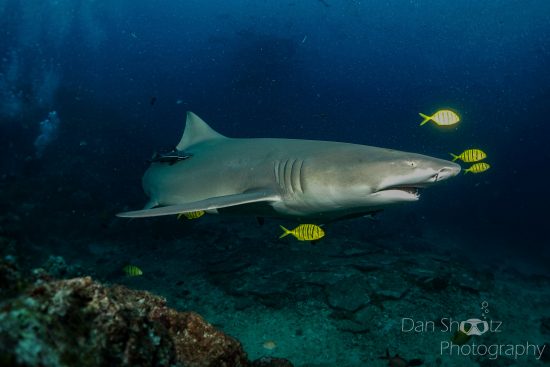
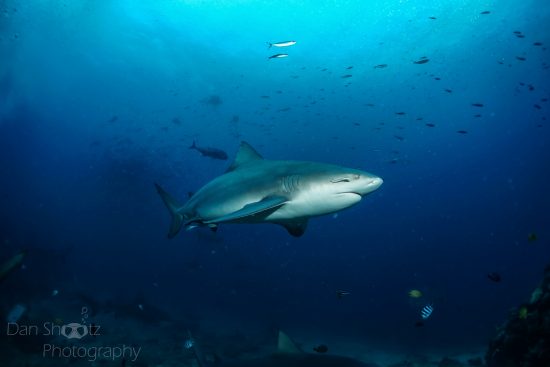
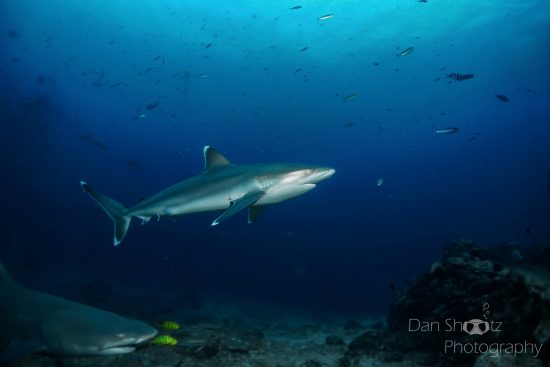
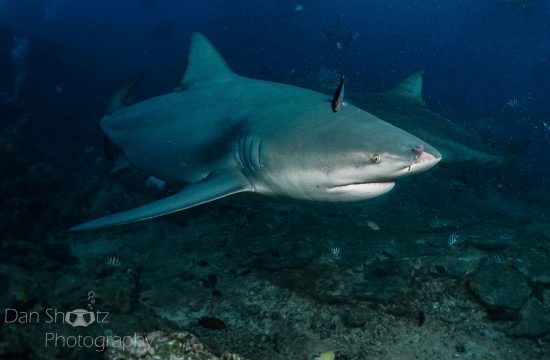
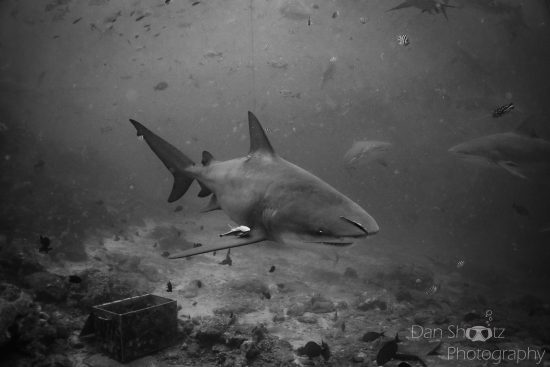
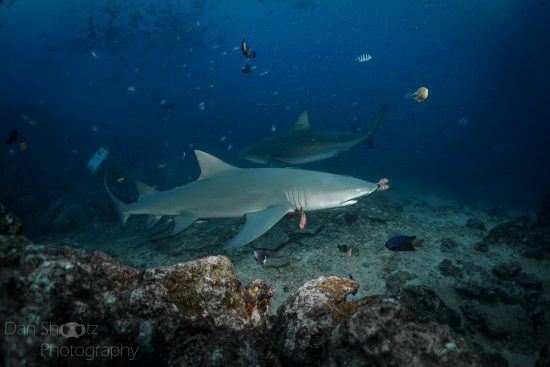
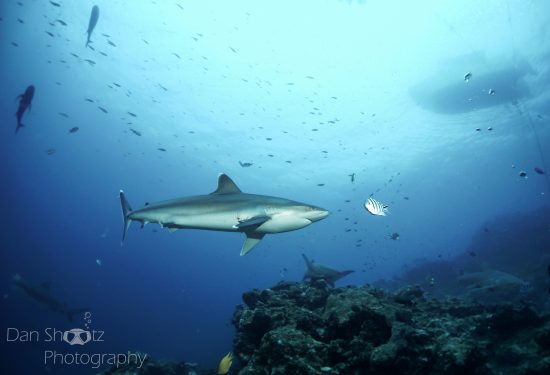
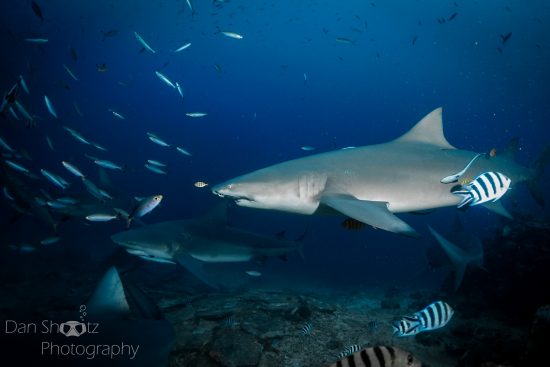
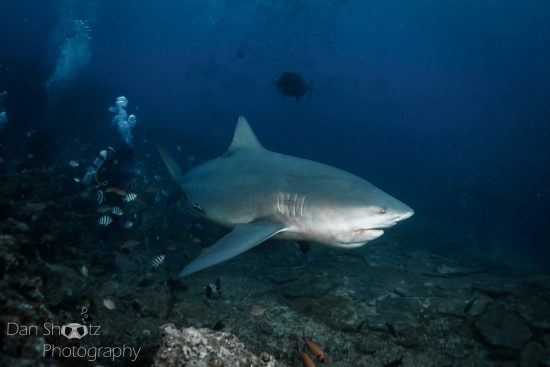
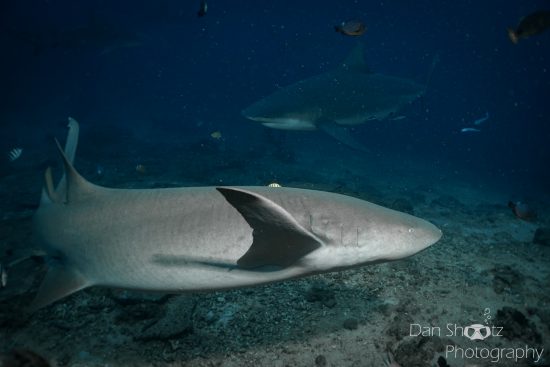
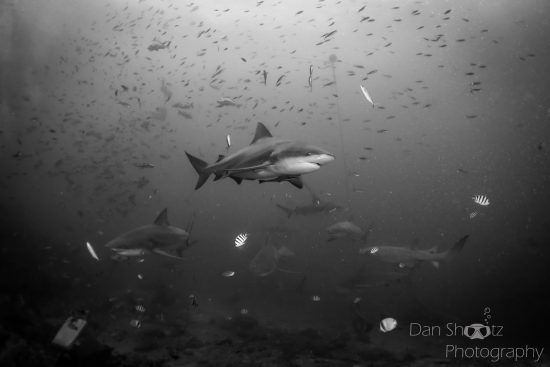
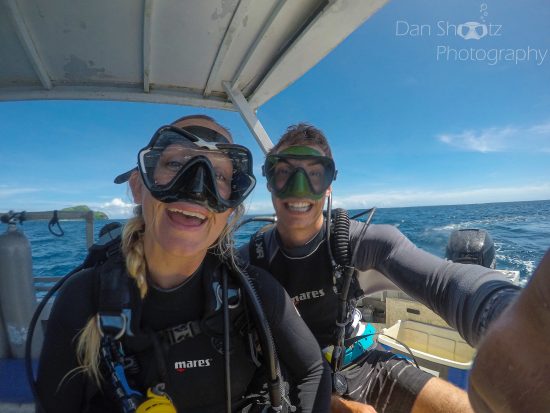
Diving with sharks in Fiji
In my opinion, every single person should experience a shark dive just once. It can quite literally change your life, from fear to fascination. Jumping in with the top of the food chain gives you the utmost respect for them, there is simply no better way to develop this understanding than sharing the water with these prehistoric treasures. As many people know, sharks are an apex predator, but just one dive with them will show you there is more to them than just their sharp teeth and terrible reputation.
Sharks are my passion and I have travelled and will continue to travel all over the world in search of them, shooting images that I hope will change people's perceptions of some of the most misunderstood creatures on this planet.
On this trip, I had a few days booked with Aqua Trek Adventures to check out their world famous Beqa Lagoon shark dive. This dive is just one big adrenaline rush, with over eight species of shark at any one time (and the possibility of seeing tiger sharks), this dive is worth every cent.
Now I can already see you shaking your head, eight species of shark on one dive ? No way. YES WAY !!
Fiji is one of the only places in the world where the locals don't eat sharks, and for good reason. In Fijian culture there is a God known as Dakuwaqa, he takes the form of a shark and watches over Fijians in and on the water. If you were to eat a shark you would anger him, and that's a no go unless you want to be left without protection, and out in the Pacific Ocean, no one wants that ...
Since the legend began, Fijian fishermen returning to the island have been throwing over fish heads as an offering to the Gods, ensuring their protection for their next voyage. Moving forward to 1999, Shark feeding began as a commercial activity and has been a huge success ever since.
As well as the sharks, this section of reef has been turned into a marine reserve, and the results are outstanding. In many parts of the Pacific, reef fish are easy to target, and tourists and local fishermen using nets, lines and spears can decimate areas of reef in just a short period of time. This section of Beqa Lagoon is different, and with no fishing allowed, Giant trevally, enormous Grouper, Coral Trout, Snapper, Eels, and thousands of other reef fish enjoy the protection of this part of the lagoon, creating a great spectacle for divers. In return for not fishing in this area, the local community is given a percentage of the cost of every dive, which discourages fishing and teaches them the importance of eco tourism in these pristine islands.
Now, in Fiji there are many types of sharks and it's common to see the majority of them on your dives. They are generally cute little reef sharks or, if you're lucky, dopey leopard sharks. On the shark dive, however, I was hoping to see the biggest and baddest of them all, the Bull shark. Bull sharks are one of the most deadliest sharks on the planet, responsible for more deaths than Great Whites, Tigers and Mako's these are sneaky, powerful sharks that are more than happy to swim kilometers up rivers to terrorise communities far inland. Having dived with a number of shark species before, but never Bulls, I was pretty excited to see how these mysterious sharks would behave.
The Shark Dive
Arriving at the boat at 7am, excitement levels were high as our Dive Masters began their briefing, explaining the need for hoods and long suits to protect us from the coral and cooler temperatures and to stop us looking like fish meat. Following this, we were introduced to the many species of shark we could see on this dive. These included grey tips, white tips, black tips, silver tips, grey sharks, nurse sharks, Lemons, Bull sharks, leopard sharks and the elusive Tiger sharks.
Arriving at the arena we suited up, donned our gear and descended the mooring line. It was 18m to the bottom and with a strong current running it was important to hold on to the line until we were close to the sea floor, from there it was a short swim to the “Arena” where the shark spectacle takes place. The appropriately named “Arena” has been developed from shipwrecks and a wall of dead coral and is where the shark feeding takes place. Sadly, Fiji has not been spared of coral bleaching, and the inner lagoons and some of the coastal diving is made up of dead coral, which is great for making a shark wall out of. But never fear, offshore the diving is epic. See my blog “Destination Fiji” for proof !!
As we approached the wall, the dive masters shuffled us into place. We then settled in and let the show begin . The Fijian dive masters, known as the shark whisperers, drifted down with their bin full of tuna heads. Supplied by the local fisherman, these fish heads were used to bring in the sharks, and much like a dinner bell going off, they arrived almost immediately. At first a few lemons, the odd nurse shark and a few smaller species, and finally the stars of the show, the Bull sharks.
As the spectacle continued, more and more sharks arrived until it was as one diver described, a sharknado. The anti shark finning campaign had clearly been working here !! Amongst the enormous bulls, dopey lemons and nurse sharks, small black tips and the rarer silvertip would race in and out grabbing scraps whenever they could. All too soon the banging on the tank meant it was time to head up for a surface interval and a short break before dive number two.
I know a lot of people are anti shark feeding for a variety of reasons, but hear me out. Any activity that gets people face to face with sharks and teaches them to respect rather than fear them has to be a benefit for such an alienated and feared species. During the shark dive, the guests got to see that sharks are not puppy dogs but they are also not human killing, mindless monsters. They play such a crucial role in the marine ecosystem, and If we don't do something soon, we could see them become extinct in our lifetime.
Dive two was much the same, as more and more sharks joined the show, calmly swimming around and over the divers, never showing any signs of aggression. Some of the sharks had been coming to the dives for a long time and knew where to go for the best feed. Many of them had special connections with some of the Fijian divers, it was simply a spectacle that has to be seen to be believed.
Dan's Shark Shooting Tips
Don't forget your full wetsuit
A full wetsuit is required to participate in this dive. Sharks can get confused if they see bits of white or flashes of skin, so a hood and full body wetsuit is a must.
No video lights
No video lights are allowed on this dive for the safety of the dive masters. As some of you know, most video lights are super bright, and you don't want to blind a shark whisperer ! Strobes are allowed, but make an effort to not shoot into the divers eyes.
Wide angle is your friend
Whether that's a fisheye, a wide angle lens or a wide wet lens, when it comes to big critters nothing beats a wide angle lens. Be patient, get close, shoot up and wait for that perfect shot. The sharks are inquisitive so will come right up to you if you're lucky enough.
Book early
With divers from all over the world keen to experience this shark dive, it can get completely booked out in the high season. Spaces are limited to keep divers safe and the sharks from too much exposure, so to avoid disappointment it's best to call and book in advance. I would also recommend booking in a couple of days as you never know what might show up from one day to the next.
If you want to see Bull Sharks it's best to avoid November to January as this is when they leave the area for mating, any other time of the year is ideal, conditions dependent.
Enjoy the dive
Don't get too caught up in taking photos or video. If conditions aren't right, or you're not getting the shots you're after, put the camera down and enjoy the dive. It's not very often you get to dive with so many sharks !!
A big thanks to Waidroka Bay Resort and Aqua Trek Adventures for this incredible shark experience.
Images and text by Dan Westerkamp
Want to join me on the adventure of a lifetime? I specialise in personalised underwater photography expeditions throughout the South Pacific. Join me in search of Sharks, Humpback whales, breathtaking dive sites and so much more. Get in touch for details!
 Dan
Dan 31st December 2020
31st December 2020